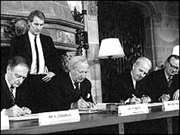 |
| The accord ends nine months of diplomacy |
| 1973: Sunningdale Agreement signed |
England have
Tripartite talks on Northern Ireland have ended in an historic agreement to set up a Council of Ireland.
British Prime Minister Edward Heath, Irish premier Liam Cosgrave, and representatives of the Ulster Unionist Party, the Social Democratic and Labour Party and the Alliance Party of Northern Ireland, signed the agreement at Sunningdale, Berkshire.
Under the accord, a "Council of Ireland" will be made up of a board of ministers, and a Consultative Assembly.
The "Council of Ministers", which will have executive, harmonising and consultative roles, will consist of seven members from the Northern Ireland Executive and seven from the Irish government.
And the Consultative Assembly will be made up of 30 members from the Northern Ireland Assembly and an equal number from the Dl.
The assembly will have advisory and review functions.
The Council of Ireland is aimed at giving the Republic jurisdiction over issues of joint concern with the north.
This will curb criticism the power-sharing executive body, founded last month, gave the Dl no powers north of the border.
Today's announcement at the Civil Service Staff College at Sunningdale, where the conference has been held, ends four days of tense deliberation.
But the road to today's agreement started in March when Secretary of State William Whitelaw sought an end to IRA violence.
London proposed an 80-member assembly - with unionist and nationalist representation - to take over the affairs of state.
Elections held shortly afterwards resulted in the power-sharing executive established and this announcement is an extension of this.
The Council of Ireland is expected to be set up and active from the beginning of next year.
The agreement is expected to enrage anti-power sharing parties who were excluded from the talks.
A Border Poll in March established popular support for remaining in the UK rather than joining the Republic.
|